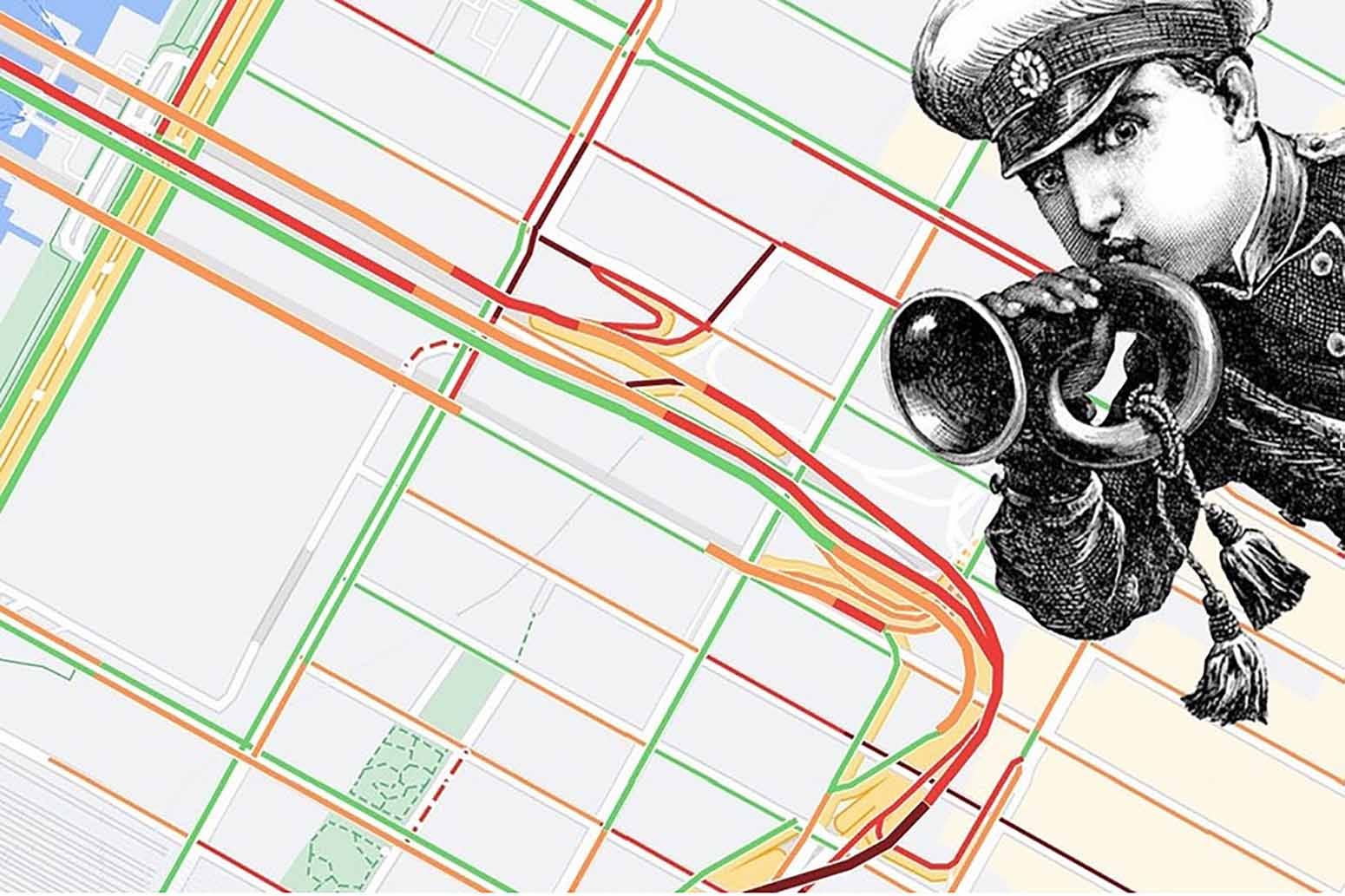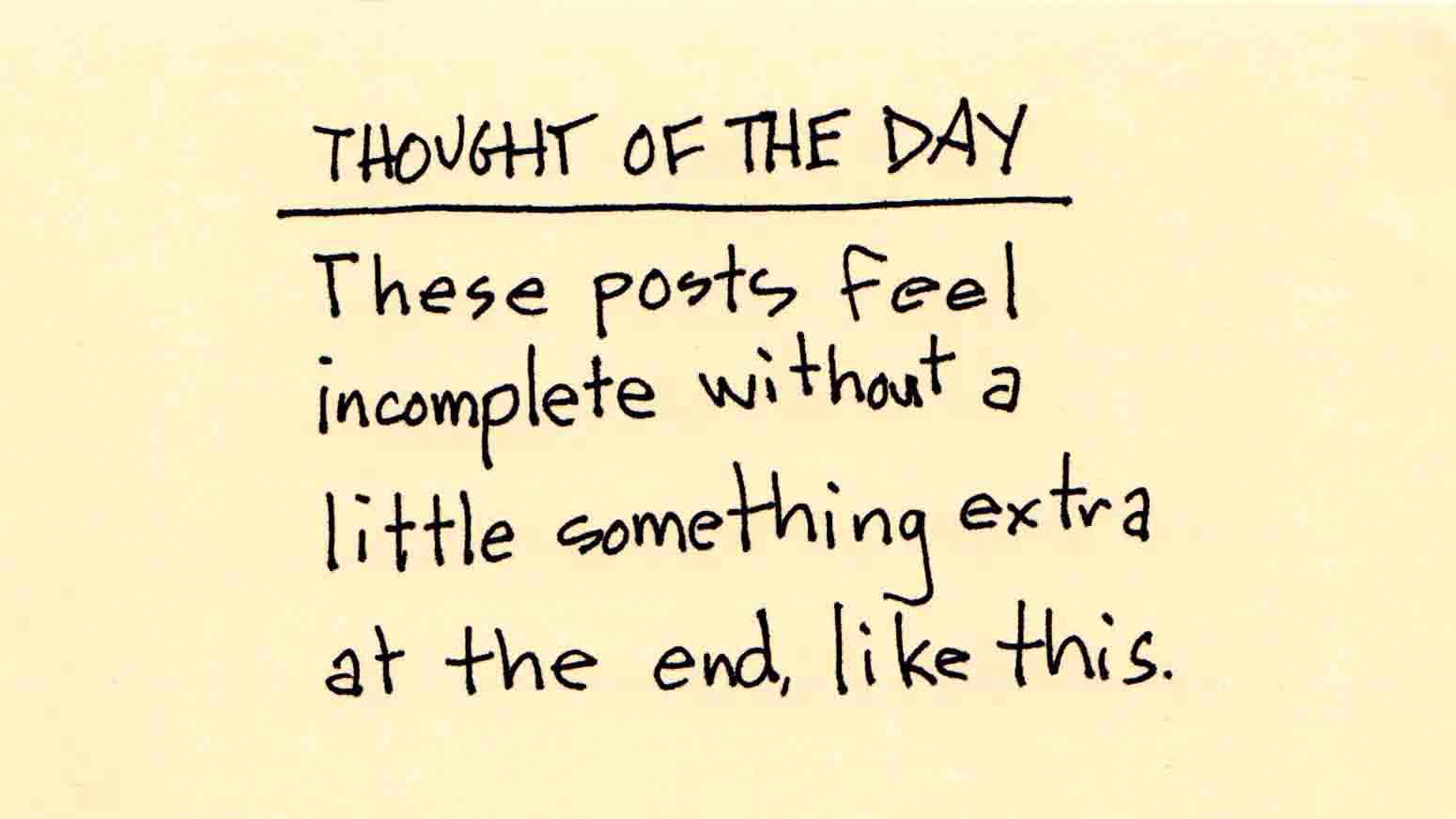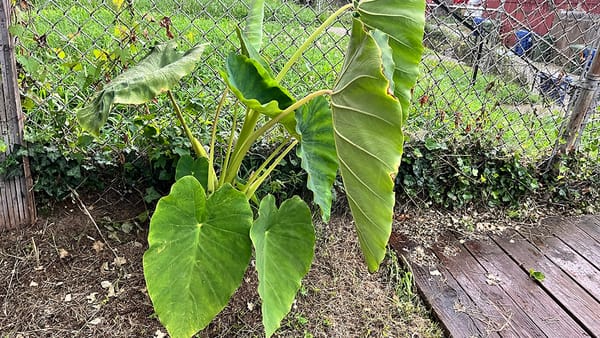Indignity Vol. 1 No. 1: Beep Beep!
PUBLIC WORKS DEP'T.

Honk Your Horn!

THIS IS A parochial concern, but more and more things in more and more places seem to be going this way: two out of the last three times I've tried to leave New York City through the Lincoln Tunnel, it's been nearly impossible. Closing in on the tunnel entrance in my rental car, I get stuck in hopeless gridlock—in the worse case, it was absolute gridlock, with the intersections in every direction sealed off for more than an hour.
The old Giuliani-era warning that blocking the box is a serious offense has expired. The whole idea of keeping intersections open is defunct. Cars and trucks and whole entire buses barricade the cross-traffic; even the basic red light/green light protocol is breaking down under the strain. It's every driver for themself, which in effect means nobody for anybody.
In this, as in so many other contemporary crises, stepped-up punishment is not the answer. Three years ago, the de Blasio administration announced it would be cracking down on box-blocking infractions, and here we are, mired in bumper-to-bumper traffic. It's not that individual drivers, unafraid of the law's strong hand, are choosing to block the box—it's that the boxes have collapsed. There's no way to be sure of getting across the intersection within the span of a light, so you either join in clogging the intersection or you never move at all.
There is a simple, preexisting, practical solution to this. The best way to keep drivers out of the box is not to threaten them, or to monitor them with cameras for retroactive punishment. It's to actively prevent them from entering the box, by sending traffic cops out to direct traffic.
It's not difficult. It requires the city government to commit to keeping the city moving, on the everyday physical level. People are on edge, but if a cop in a safety vest physically signals them to stop short of an intersection, or waves them through, they'll still go along with that.
I saw this principle in action, fleetingly, on that worse trip to the tunnel. After we'd spent two hours creeping five blocks, with no way to escape, two minicars' worth of cops finally arrived on the scene, took up position in the last two intersections, and got things moving forward more or less immediately. The other time, though, when a traffic police minicar showed up, it simply blocked a crosswalk along with everybody else through one cycle of the stoplight, then squeezed away somewhere and disappeared.
Ideologically, I support the premise that driving in the city should be a miserable experience, to discourage people from doing it. But cars fully stuck in traffic just generate useless heat and emissions, creating obstacles for pedestrians and obstructing emergency vehicles. What Manhattan needs is a car-hostile but well-enforced speed limit—5 miles per hour, say—at which traffic flows smoothly, actively directed by the traffic authorities. At 5 mph, it would take six minutes to go 10 blocks. This would be a dissatisfying way to drive, as it should be. It just wouldn't wantonly waste fuel and hours of everyone's life.
New York City, however, is not willing to do it. The official speed limit is 25, and the unofficial speed limit is often enough zero. Even though car owners are disproportionately powerful in policy and politics (and even though they tend to be cop-friendly reactionaries), no one is making the elementary effort to break up gridlock. People sit in their cars and stew.
And they sit in their cars and stew quietly. Once in a while, an individual driver snaps and starts pounding on the horn, or a particularly outrageous maneuver gets people honking at it. When one of those idiotic four-door Ferrari SUVs chose to run a light in front of trapped cars going to the Lincoln Tunnel, it raised a blast of abuse. The general situation, though, is greeted with silence—even though "No Honking" enforcement is as obsolete as "Don't Block the Box."
Honking is bad behavior. Everyone knows this, and most people still live by this belief, even in the face of the breakdown of vehicular civilization. Using your horn to vent your emotions about a traffic jam only makes it worse for everyone who's stuck along with you. It is selfish and pointless.
Is it really, though? What does anyone gain from suffering noiselessly? The traffic jams on the way to the Lincoln Tunnel aren't strokes of misfortune; they're predictable failures of government. The cops are too lazy to do anything about it. Their priority is camping out in the subway stations, out of the hot sun, waiting to jump people for evading a $2.75 fare. The mayor, despite his noises of three years ago, is too detached. The problem isn't a big enough problem for the authorities to care about.
What if instead of gritting their teeth or yelling at the squabbling children in the back seat, everyone just collectively went ahead and leaned on their horns? Not as a gesture of futile individual aggression, but as one of solidarity against needless suffering? The problem of the traffic jam would suddenly belong to more people than just the ones currently trapped in their cars. It would be a problem for anyone within a multi-block radius—a public nuisance and a municipal embarrassment.
Why pretend things are OK when they're falling apart around us? The pandemic is still spreading, the planet is still catching fire; our governments and institutions envision nothing but further failure, neglect, and abandonment. Quiet fatalism isn't doing the job. It's easy enough to make a ruckus instead. Hit the big button in the middle of the steering wheel, and see if it makes a difference. The only other alternative is the George Washington Bridge.

THOUGHT DEP’T.

Do you have a thought? Send it to indignity@indignity.net.






